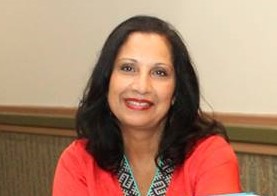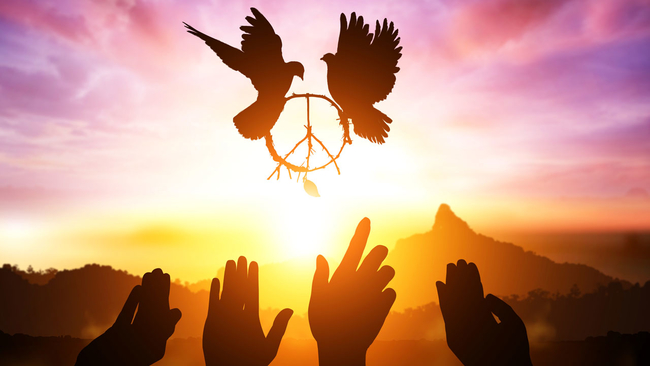Especially when evil prevails more and more
As human beings, we respond to other human beings from the very first moment of birth. We may not have the words, but the very touch of another loving human being can soothe us. Slowly we start to respond to facial expressions, and then we learn words, sentences and by teenage time have learned to respond with sarcasm even, not a small feat!
Because we were created as different races, ethnicities and faiths, we learn our tribe’s system of communications, and we learn to love and honor our tribe. We also learn to dislike or hate others. So, by the time we are adults, we are going around praising our own tribe and spewing contempt, misunderstandings and even hate for the “Other”.
“Other” is a dialogue term to teach new conversation skills when speaking with people who have “other” views than your own
Unfortunately, very few empires have set examples of peaceful dialogue and coexistence, and even they did, these heavenly periods did not last long. Hatred simmering for hundreds of years erupts suddenly, like in Bosnia, the new Hindutva India, etc. I used to always call the USA the first global experiment in true multiculturalism, but it seems to be failing badly.
I had to learn different cultures as I grew up multiculturally. So, naturally I was drawn to the field of dialogue. I left my computer science based career on Wall Street, and started working both in corporations and non-profits practicing dialogue. In corporations, I worked with dysfunctional groups to create common understanding and increase collaboration and innovation. In non-profit groups, I helped polarized groups learn to understand each other, rather than hang on to their pre-conceived notions about the “Other”. What encouraged me are the hundreds of small changes I saw in people: somewhere along the line they would give up a firmly entrenched belief or judgment by which they had painted a whole group, an entire tribe. It was a small victory but always gave us hope as dialogue practitioners. What inspired me is the saying that “dialogue is the oxygen of peace”, and “dialogue and violence cannot co-exist”.
What was so powerful about these processes is that one learned to look within, i.e. the hard work was the “inner work” not the “outer dialogue”. As trust built up, people would feel vulnerable and truthful enough to admit their own blinders, negative beliefs, judgments and assumptions about the “Other”. And as they shed them slowly, they felt a freedom and enlightenment of understanding within whilst the “other side” felt heard and understood. And always, the human values of dignity and respect, justice and peace, equity, diversity, etc. underpinned these dialogue processes. So, a key to dialogue and peace is owning one’s own hate, disrespect and denigration of the “Other”, i.e. the inner work of humility, atonement, repair (as in Tikkun Olam in the Jewish faith), reconciliation and compensation.
It was not until the recent violence and hate that has killed tens of thousands of innocent human beings in the Middle East- 14,000 Palestinians (a number growing daily) and 1,400 Israelis- that unleashed a hate storm and a silencing of anyone standing up for human rights and international law that I just gave up. I have no words left for where we are today in our world. Can dialogue ever happen where so much suffering has been inflicted? Is dialogue even allowed in the silencing of voices that speak for the victims?
Even as a practitioner of dialogue, my own rage and grief led me to leave anyone that was supporting the “other” side. I just could not be with them and exchange any words that would not hurt them or be seen as an attack, and vice versa. I felt I had to go within and honor my grief, my sadness, my pain and even my fear as the public discourse is getting uglier and uglier. More hate is being unleashed through weaponized labels that have been ingrained in people’s beings to the point of being unquestioned. Language has become a tool for violence and killing, so I would rather be silent in grief. The same language I use as a dialogue practitioner to heal and bring peace in intimate settings has been distorted to the point of bizarreness.
I don’t know how long I will need to recover my balance and even want to jump back into the dialogue space again. For now, I am just helping groups that are advancing dialogue in the world, and we merely share our grief and our pain at what is going in the world and hold each other up as we lose our balance, like me. Deep inside, I am not hopeful if we can ever make a difference in a world where basic values of freedom, liberty, equality, dignity, empathy, generosity and kindness have been bombed out of existence.
We are all searching for quiet, space and reflection as we dream of a stop to this madness.
I wonder what conditions would have to exist to allow healing dialogue and restoration of peace? I will be looking for inspiring examples to get us out of this mess, such as the Irish who suffered for 700 years, or the South Africans who suffered so much and invested in reconciliation not revenge. I will silently keep this hope alive for the people suffering so much in the Middle East, and other conflict areas of the world. I will continue to listen to people like Gabor Mate and Rashid Khalili speak the truth and expose the trauma. And I will pray that dialogue will help us one day.


Be First to Comment